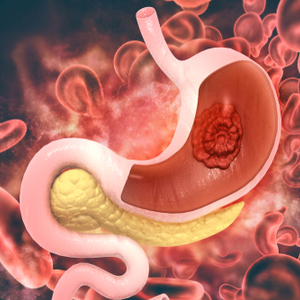
What is stomach cancer?
Every year,about 15,000 people in Germany develop stomach cancer (gastric carcinoma), a malignant tumour disease that affects the stomach. Stomach cancer is caused by degenerated glandular cells in the stomach lining. Since stomach cancer does not cause any symptoms for a long time, it is usually diagnosed quite late.
What promotes the development of stomach cancer?
There are probably numerous risk factors that promote the development of stomach cancer. Dietary habits are probably the most important factor. Salted, spicy, fried, cured and/or smoked foods are suspected of causing stomach cancer due to the nitrates they contain. In particular, people who eat a very meat-heavy diet risk the bacterium Helicobacter pylori getting into their stomach. This bacterium causes nitrates to be converted into nitrites, which are carcinogenic. But excessive consumption of nicotine and alcohol can also lead to stomach inflammations and ulcers, which can become malignant.
People who are generally prone to stomach diseases have a higher risk of getting stomach diseases. This includes stomach ulcers, but also more rare diseases like autoimmune gastritis. In addition, genetic factors also play a role in the development of stomach cancer that should not be underestimated. If a family member already has this disease, it often affects other family members as well, whereby eating habits can also serve as an explanation for this in addition to the genetic predisposition.
What are typical symptoms of stomach cancer?
A stomach carcinoma usually causes symptoms quite late and is therefore not usually diagnosed early. If non-specific symptoms occur nevertheless, most patients explain these with a sensitive stomach. These include
- sudden aversion to certain foods
- sensitive reaction to foods that were previously well tolerated,
- Heartburn, lack of appetite, feeling of fullness and/or nausea, which result from the fact that the stomach carcinoma is located at the stomach outlet and thus blocks the passage of food towards the intestines,
- Weight loss,
- Pain and/or a feeling of pressure in the upper abdomen; in advanced stages, the carcinoma can even be felt in the upper abdomen,
- Accumulation of water in the abdomen (ascites), caused by the tumour in the peritoneum,
- Tiredness, listlessness and/or impaired performance,
- Blood during vomiting and/or
- black stools,
If the stomach carcinoma has already developed metastases, the liver may also malfunction. This means that the red blood cells are no longer excreted through the bile and are deposited in the skin, which can cause the mucous membranes and skin to turn yellow (so-called jaundice). Women may complain of pain during sexual intercourse or vaginal bleeding, which can be explained by the fact that the carcinoma has already metastasised to the ovaries.
How is stomach cancer diagnosed?
After taking a medical history, the attending doctor will palpate the abdomen for enlargements of the lymph nodes. If stomach cancer is suspected, the oesophagus, stomach and upper small intestine are usually examined more closely by means of an endoscopy. If a suspicious tumour is found during this examination, the doctor will take a tissue sample, which will be examined in the laboratory for the presence of tumour cells. If necessary, a blood and/or stool test may also be ordered.
However, to finally confirm the diagnosis of stomach cancer, either an ultrasound, a scintigraphy of the bones, a computer tomography or an X-ray of the abdomen or chest will be taken. This also allows the doctor to identify any metastases that may have already formed in the lungs, pelvis or bones, for example. Ultimately, this will also determine the exact type of tumour and its stage. This information is crucial for deciding on further treatment.
If stomach cancer is diagnosed in the first stage, the chances of cure are between 70 and 80 percent. In the fourth stage, on the other hand, they are less than 5 per cent. However, even in those late stages, there are life-prolonging and pain-relieving treatment options.
What types of stomach cancer can be distinguished?
In addition to malignancy, stomach cancer is also divided into four so-called gradings (G1 to G4) according to how far it has spread to other parts of the body and to the lymph nodes. In addition to the tumour size, the fact whether the cancer has already metastasised or not also plays a role here. If it is a high stage, the cancer is already very advanced.
How is stomach cancer treated?
Stomach cancer is usually removed completely by surgery. If stomach cancer is diagnosed at an early stage and has not yet spread to the lining of the stomach, doctors can perform a minimally invasive procedure called keyhole surgery. In this case, the tumour is removed through small incisions in the skin during a gastroscopy. At a later stage, if only a smaller tumour is present, part of the stomach and the nearest lymph nodes are surgically removed or the stomach is removed completely (gastrectomy). The surgeon will then form a replacement stomach through a section of the small intestine.
Unlike other types of cancer, radiation therapy and/or chemotherapy are only partially successful for stomach cancer. However, both treatment methods can be used in a supportive way, for example to reduce the size of the tumour and thus make the operation easier.
In the days after the operation, the patient is fed through a stomach tube and slowly introduced to a change of diet. Within the rehabilitation measures, which are carried out either as outpatient or inpatient treatment, the patient learns to cope with his or her illness. Alternative healing methods such as acupuncture can be used, especially for nausea symptoms. Depending on the severity of the stomach cancer, some patients also need to be fed artificially.
Inthis case, a so-called PEG tube is inserted.
If stomach cancer is only diagnosed in the terminal stage, antibody therapy is often used to inhibit the growth of the tumour. Other palliative measures can prolong the patient's life and ensure a pain-free time.
a